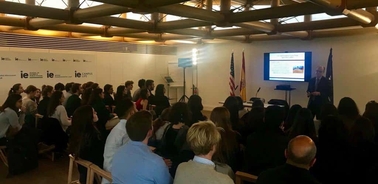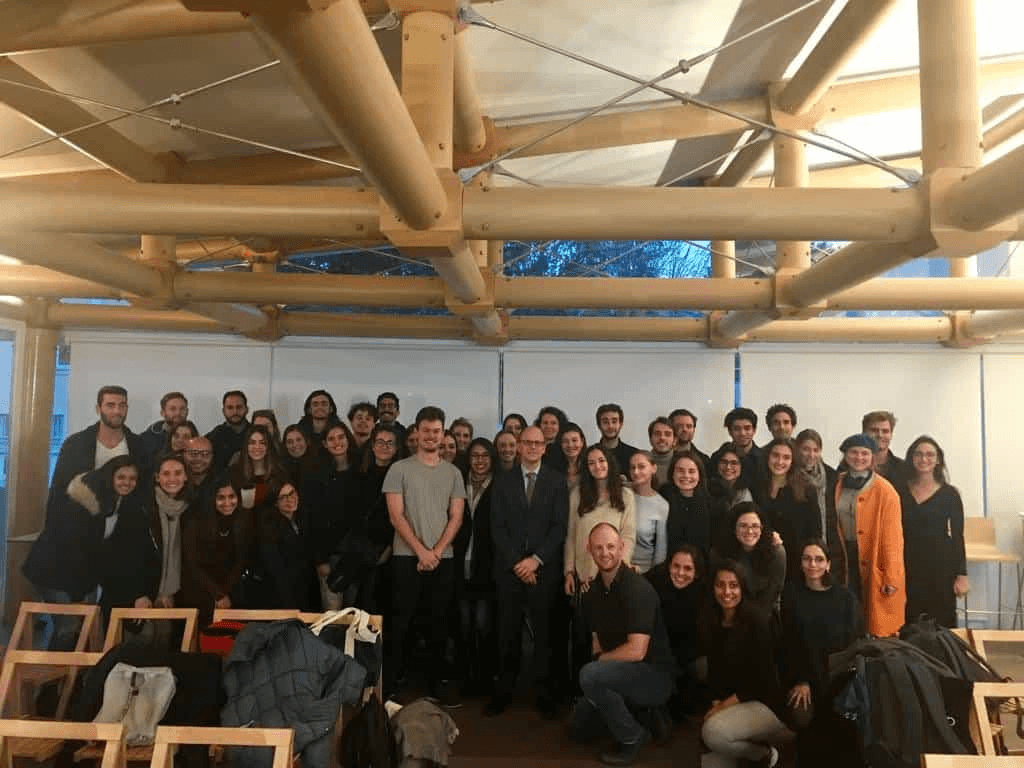- Home
- The State Of Trade Between Spain, The European Union And The United States - With Guest Speaker Thomas Reott Economic Counselor To The U.s. Embassy In Spain
The State of Trade Between Spain, the European Union and the United States - with guest Speaker Thomas Reott Economic Counselor to the U.S. Embassy in Spain

In the midst of shifting American foreign policy and talks about trade wars between the United States and China, Economic Counselor to the U.S. Embassy in Spain, Thomas Reott, addressed the consistent trading partnership between the U.S. and Spain in his talk The State of Trade Between Spain, the European Union, and the United States Nov. 29 in the Paper Pavilion. He began by describing his position of the economic counselor as being two sides of the same coin; on one hand, he needs to inform policymakers in Washington D.C. about what is happening in Spain in the economic front, banking sector, and where risks and opportunities for American companies to grow are located. On the other, he has to explain the U.S.’s objectives in the country to Spanish audiences, the private sector and the government.
During the previous administration, Reott said, this intermediator role was easier, with not much controversy. The times, however, have changed as the world tries to grasp America’s new role in global affairs and to understand if protectionism is the route it is headed. He claimed that much of the background noise that dominates the discussions tend to get in the way of objectives and effective policy-making, and that this needs to be put aside so an open, honest dialogue is possible and agreements succeed, especially because Spain and the European Union are very much in alignment with overall American objectives.
"Spain and the U.S. are united by history and common values that underpin our partnership,” Reott said. "We work closely together on a range of global challenges, including promoting international cooperation, peace and security, and economic prosperity.”
Reott then addressed the specific economic figures that illustrate the Spanish-American trade partnership. He said that with US$24 billion in goods and US$12.4 billion in services traded, Spain is the U.S.’s 25th largest trading partner while the U.S. is Spain’s sixth. In terms of investment, Spain is the 11th largest investor country in the U.S. supporting more than 81,000 American jobs, while the U.S. is Spain’s largest investor, employing 178,000 people and being ahead of neighboring European countries such as Italy, France, Germany and the United Kingdom. These commercial and investment relations are strong, Reott said, sustaining a fruitful partnership between the two countries.

Reott also addressed the issue of steel and aluminum tariffs put by the United States on their domestic products, making use of Section 232 of the Trade Expansion Act of 1962 and the right to take measures to protect national security interests. The European Union and Canada — the main exporters, and main American allies — have taken the U.S. to the World Trade Organization and requested a panel to review this decision, as they claim it violated WTO guidelines of trading with most favored nation-level tariffs. As the American steel manufacturers were disappearing, unable to compete with imports, the tariffs were put in place with the argument that in the case of conflict or war the U.S. would not have the ability to use its domestic supply of steel to defend themselves. The very controversial decision, however, contradicts the status of champion of free trade that the United States has always claimed, in addition to the fact that Section 232 and national security claims are used very rarely and with extreme caution, as it sets a precedent that anything can be made to be a national security argument. In addition, Section 232 is self-determining and others are not allowed to question it; Reott called it “the silver bullet.”
"It’s not intellectually honest to say that we’d be lost in case of a war, it’s not accurate. But once you shut down a steel plant, they’re not going to open up again. Not that this would be a death-now to the U.S., we would still be able to search for other markets, but you need to have domestic production capacity,” he said.
To conclude his talk, Reott talked about China being the biggest problem in the global commercial system. “They have a lot of restrictions on investments, are a member of the WTO but do not comply with most favored nations rule on tariffs, they self-declare as a developing country, and this has been going on for 20, 10, 5 years and it has been accelerating,” he said. Reott added that if there is a level playing field in the global economy, the U.S. can compete with China, and so can the European Union; the problem is that countries are not playing by the same rules. Despite how closed their market is, Reott said, China is doing a great job in public relations and somehow is riding the horse. He said that the people currently benefiting from flaws in the system have no interest in reforming it, and that the U.S. has been trying to bring about reform for years, if not since before Barack Obama at least since Obama himself. He added that Obama was very diplomatic, but Trump is a lot less and decided to take more dramatic measures.
“That’s what makes my job more interesting,” Reott said. "We have to do a better job in our message, partnering with the Spaniards and the EU. We truly are partners, our economies are so incredibly integrated with each other. We agree on 90 percent of things, we cannot live without each other, and we need to figure out how to get together and solve the challenges.”
About the author: Giovanna Z. Rinaldo is a journalist and a Master’s of International Relations student at IE University. She can be found on Twitter @giozrinaldo and on LinkedIn.